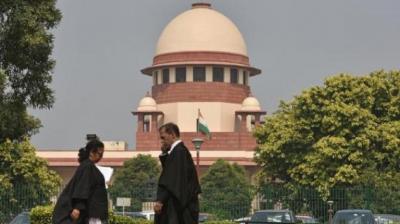Dilip Cherian | Scare in Maha after ED action in Covid jumbo centres scam
The worries among IAS and IPS officers escalated further following the ED’s questioning of municipal commissioner Iqbal Singh Chahal
The recent action by the Enforcement Directorate (ED) against IAS officer Sanjeev Jaiswal, allegedly involved in the Covid jumbo centres scam, has sparked apprehension among many IAS officers in Maharashtra. This apprehension stems from a backdrop of several IAS and IPS officers being incarcerated over the past few years due to their involvement in power struggles. Consequently, senior IAS and IPS officers recently convened a meeting with chief minister Eknath Shinde and deputy chief minister Devendra Fadnavis to address their concerns.
Among the officers who found themselves embroiled in controversy were IPS officer Rashmi Shukla and Parambir Singh, both under scrutiny in various cases. IAS officer Sushil Khodvekar was arrested in connection with the TET scam after his name emerged, while IPS officer Sourabh Tripathi faced an FIR in an extortion case and subsequent suspension. These criminal cases reportedly dissuaded other IAS officers from offering support to their accused colleagues.
The worries among IAS and IPS officers escalated further following the ED’s questioning of municipal commissioner Iqbal Singh Chahal regarding alleged irregularities in the Brihanmumbai Municipal Corporation (BMC). Within municipal corporations and other departments, important matters are scrutinised by the vigilance department, and the documents are submitted to senior officers. Some IAS officers have snidely commented that perhaps the government needs to appoint ED and CBI officers to review crucial files before signing them! Babus also try hard to avoid pressures exerted by politicians on various issues to escape being subjected to a probe by central agencies.
But building trust between the central agencies and the state babus may well be a tall order.
Bold assertion or political manoeuvre in Punjab?
As previous events have shown, the Bhagwant Mann-led AAP government in Punjab rarely sees eye-to-eye with the Centre on administrative issues. The state government has recently passed a bill for the appointment of the director general of police (DGP) in a special session of the state Assembly, which is quite likely to create another contentious issue.
While this bold move raises questions about the balance of power between a state government and the Centre, some observers see it as a political step aimed at challenging the authority of not just the Centre but also the Supreme Court.
The amended Act suggests the formation of a committee chaired by a retired high court judge to finalise a panel of candidates for the DGP position. The state government would then appoint the DGP from this panel, disregarding the Supreme Court’s earlier ruling on the matter. Meanwhile, next month, Gaurav Yadav, a 1992-batch IPS officer, will complete one year as officiating DGP of Punjab. By passing the amendment, the Mann government is signalling its willingness to assert its own authority and decision-making power in matters that directly impact the state.
While the Punjab government is within its rights to choose its course of action, it is crucial to ensure that such decisions are made in the best interests of the state and avoid confrontations with the Centre and the higher judiciary. The fallout of the move will be felt across the nation.
Centre imposes permission protocol for civil servant awards
Following criticism faced by several officers in different states for receiving awards from dubious organisations, the department of personnel and training (DoPT) has made prior approval mandatory for IAS, IPS and IFoS officers before accepting any award from private organisations, and it should not have any monetary component in cash or facilities.
The department has stated that the competent authority may grant approval only in exceptional circumstances to the officers; in such cases, the credentials of the private institutions and organizations should be unimpeachable. Sources have informed DKB that this order only restates existing instructions, which were being blithely ignored by many officers. This decision, observers note, seeks to strike a delicate balance between the need for genuine recognition and the preservation of integrity within the civil service.
Interestingly, earlier this year, the Kerala government issued a similar order directed to all IAS and IPS officers in the state not to accept awards from private organizations or individuals without prior approval. The state chief secretary, V.P. Joy, had stated that officials would have to apply through the general administration department for the sanction, failing which they would face strict action. The order followed complaints from some Kerala police officials about an IAS officer who received an award for effective management of devotees at a prominent temple in the state.
The present order from the Centre indicates that the issue is faced by several states and has decided to enforce a clear line between personal affiliations and official duties. But will babus fall in line?



















